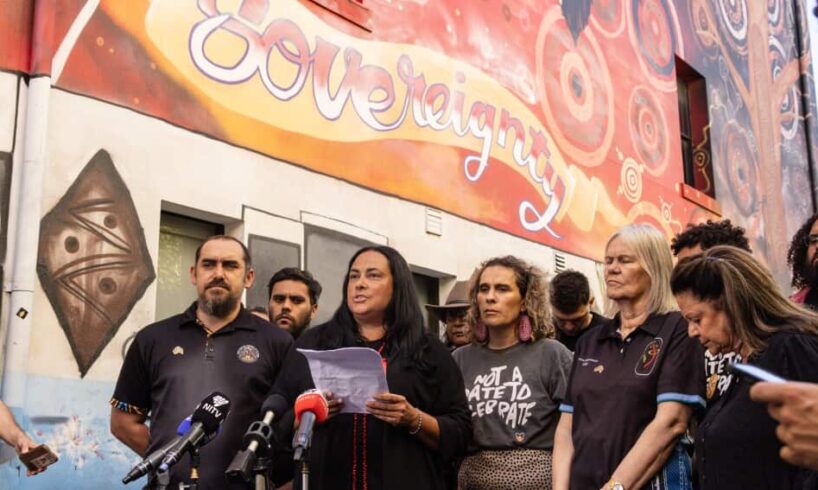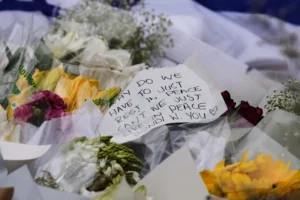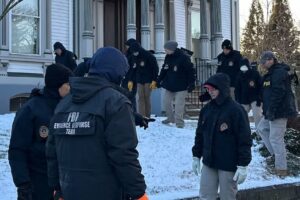
Victoria has become the first state to pass legislation enabling a Treaty with Indigenous Australians, with the passing of the landmark Statewide Treaty Bill in parliament on Thursday night.The legislation has been hailed as a historic turning point that will improve outcomes in justice, health, education and cultural recognition for Indigenous Victorians.The idea of a Treaty or Treaties with Australia’s Indigenous Peoples has been debated and dissected for close to 200 years.As early as 1832, the governor of Van Diemen’s Land, George Arthur, concluded “it was a fatal error in the first settlement of Van Diemen’s Land that a treaty was not entered into with the Natives”.
Australia is one of the only Commonwealth countries without a treaty with its First Nations peoples.
Speaking earlier this week, First Peoples’ Assembly of Victoria co-chair Ngarra Murray called the Treaty in Victoria a bold and necessary step — one that recognises the sovereignty of First Peoples and charts a new future where truth, justice and prosperity walk side by side.”Treaty creates a new middle space where the unfinished business between the Crown and First Peoples relations can be addressed, and where communities can shape agreements that honour First Peoples’ culture, inherent rights and shared futures,” she said.Former Treaty Advancement commissioner Jill Gallagher AO — who played an instrumental role in Victoria’s decade-long path to Treaty — said its passing marks the start of a new chapter in the state’s history.”Treaty is not just about recognition — it’s about justice, healing and truth-telling. It’s about a future that we can all be proud of,” she said. With the passage of the bill through parliament and royal and cultural assent, the negotiated Treaty will be signed by both parties by the end of the year.The Statewide Treaty Bill enshrines a democratically elected body for First Peoples.
Called Gellung Warl, the new representative body will be consulted on laws and policies affecting Indigenous communities.
Former Treaty Advancement commissioner Jill Gallagher AO said Treaty was not just about recognition, but about “a future that we can all be proud of”. Source: AAP / James Ross
Gellung Warl will be a body corporate that consists of the First Peoples’ Assembly, Nginma Ngainga Wara and Nyerna Yoorrook Telkuna.Nginma Ngainga Wara, a new Outcomes and Justice Commission, will sit within the First Peoples’ Assembly of Victoria. Nginma Ngainga Wara means ‘you will do’ in Wadi Wadi language.The commission will have the power to hold government and publicly funded bodies accountable for outcomes for First Peoples by conducting parliamentary committee-style hearings, asking questions of ministers, conducting system-wide inquiries, and running program-level evaluations.Nyerna Yoorrook Telkuna will continue the truth-telling and healing process started by the Yoorrook Justice Commission.Nyerna Yoorrook Telkuna means ‘to sit, to listen, to hear, to remember’ (Nyerna), ‘to truth’ (Yoorrook), ‘to cure, to heal’ (Telkuna) in Wamba Wamba language.
The negotiated Treaty requires a formal apology from the state government to the First Peoples of Victoria, which is expected to be delivered in the coming weeks.
First Peoples’ Assembly of Victoria co-chair Ngarra Murray called the Treaty in Victoria a bold and necessary step. Source: AAP / Diego Fedele
Murray said the process towards Treaty has been more than a decade in the making, and Indigenous Victorians have taken the time required to lay strong foundations for Treaty.”We have been on a long and steady path to Truth and Treaty for nearly ten years. We have passed legislation twice — we have developed policies, and made commitments across the parties,” she said.”For nine months, we walked through the intensity of history in the making with the very first Treaty negotiations. They were demanding, at times exhausting, but always deeply significant.”Each conversation has carried with it not just policy or politics, but the weight of the generations who dreamed of this moment — and the responsibility to honour those yet to come.”Treaty is not the end of the journey — it is the beginning of a new one.”The Victorian Coalition does not support Treaty and has vowed to repeal the legislation that underpins it within the first 100 days of forming government.After initially supporting a state-based Treaty, the state Opposition withdrew its support in January 2024, following the failure of the national Indigenous Voice to Parliament referendum, citing concerns about cultural heritage processes causing development delays and resulting in higher construction costs.So, where do other jurisdictions in Australia stand when it comes to a treaty process?
To learn more about the Victorian Treaty and other Treaties, watch The Point’s episode Treaty Now or Never via SBS On Demand.
Where are the other states and territories on Treaty?
The ACT government has committed to progressing Treaty since establishing an Aboriginal and Torres Strait Islander Elected Body (ATSIEB) in 2008.The ATSIEB works with the ACT government and local First Nations communities to deliver the territory’s Aboriginal and Torres Strait Islander Agreement 2019–2028.In 2022, the ACT government published an implementation plan for Treaty, and a year later announced it would establish a panel for community engagement, after the implementation plan was met with criticism over its lack of engagement with First Peoples’ communities.To date, there appear to be no further developments concerning the panel.NSW Labor committed to Treaty before both the 2019 and 2023 state elections.After Labor won the 2023 state election, the new Aboriginal Affairs Minister David Harris indicated he would oversee a 12-month consultation period following the referendum later that year. The consultation would engage with First Nations people, Traditional Owners, native title holders, organisations and peak bodies. It would be led by three commissioners and an appointed secretariat, and would report back to parliament on its findings.However, following the referendum’s defeat, NSW Premier Chris Minns stated NSW’s treaty process would not progress past the consultation and planning phase until after an election.A consultation process started in August 2025, and the commissioners have been tasked with seeking to “understand the views of Aboriginal people on whether there is support for a treaty or other formal agreement-making process and, if so, what a future treaty process might look like”. The commissioners will prepare a final report for the Aboriginal Affairs minister on the outcome of the consultation, including recommendations on whether a treaty process is desired and pathways forward.In June 2018, the NT Labor government signed a memorandum of understanding with the territory’s Aboriginal land councils to “provide for the development of a framework for negotiating a treaty with the First Nations of the Northern Territory of Australia”.The NT government acknowledged it had chosen to slow the treaty process while the national Voice referendum was taking place, and in 2024 announced it was reviving the Treaty Working Group with land councils to progress a pathway to Treaty.
At the 2024 territory election, the Labor Party was defeated by the Country Liberal Party.
After the County Liberal Party won NT’s elections in 2024, new Chief Minister Lia Finocchiaro said the government would not be pursuing plans for Treaty with Aboriginal people. Source: AAP / (A)manda Parkinson
New Chief Minister Lia Finocchiaro stated the NT government would no longer be pursuing plans for Treaty with Aboriginal people, and would instead be focusing on local government reform.In July 2019, under then-premier Annastacia Palaszczuk, the Labor Queensland government signed a joint statement of commitment as part of its Tracks to Treaty —Reframing the relationship with Aboriginal and Torres Strait Islander Queenslanders initiative.In February 2023, Palaszczuk introduced the Path to Treaty Bill, which was passed in April 2023 with bipartisan support.Later that year, while in Opposition, the Queensland LNP withdrew its support for Treaty in the state following the Voice referendum.After winning the 2024 state election, the new LNP government, under Premier David Crisafulli, repealed the Path to Treaty Act, stopping work on the Path to Treaty. The Crisafulli government stated this represented a “fresh start” for Queensland, and that funds would instead be reallocated to “boost tangible outcomes in Indigenous communities across key sectors including housing, education, health, and employment”.In 2016, the Labor government in the state announced the facilitation of a treaty process.Since its election in 2022, the Malinauskas Labor government has focused on progressing a First Nations Voice to Parliament.
The First Nations Voice Act 2023 was enacted in March 2023, formally establishing a First Nations Voice in the state.
South Australia now has the first and only First Nations Voice in Australia, and one that is committed to progressing Treaty.The act is intended to complement provisions of any other act “that implements measures to progress Truth and Treaty, as identified in the Uluru Statement from the Heart”. Voice members also meet with the Aboriginal Affairs minister to discuss how to progress Treaty in South Australia.Aboriginal Affairs Minister Kyam Maher, the state’s first Aboriginal attorney-general, has previously indicated Treaty is a priority, and he intends to restart the process in the state.In June 2021, the Tasmanian Liberal government appointed former governor, professor Kate Warner, alongside Tasmania University Law School professor Tim McCormack, to consult with the state’s First Nations people to “find an agreed pathway to reconciliation”.In March 2022, then-Premier Peter Gutwein announced the government would establish an Aboriginal advisory body to work with the government on establishing truth-telling and treaty processes in the state.But in May 2025, the Tasmanian government announced it would no longer pursue a treaty process with the state’s Aboriginal peoples and would instead allocate funding for truth and healing commissioners. This change in direction was based on advice from the Aboriginal Advisory Group, which supported the government’s decision.In 2015, the former Western Australian Liberal government, under then-premier Colin Barnett, signed the South West Native Title Settlement agreement with the Noongar people, represented by the South West Aboriginal Land and Sea Council.In 2024, the Labor WA government indicated that, rather than focusing on treaty negotiations, it was instead working to resolve native title matters by agreement, through “genuine, culturally appropriate and enduring partnerships” with Traditional Owners, and highlighted three more native title settlement agreements had been reached in the state.
Source





